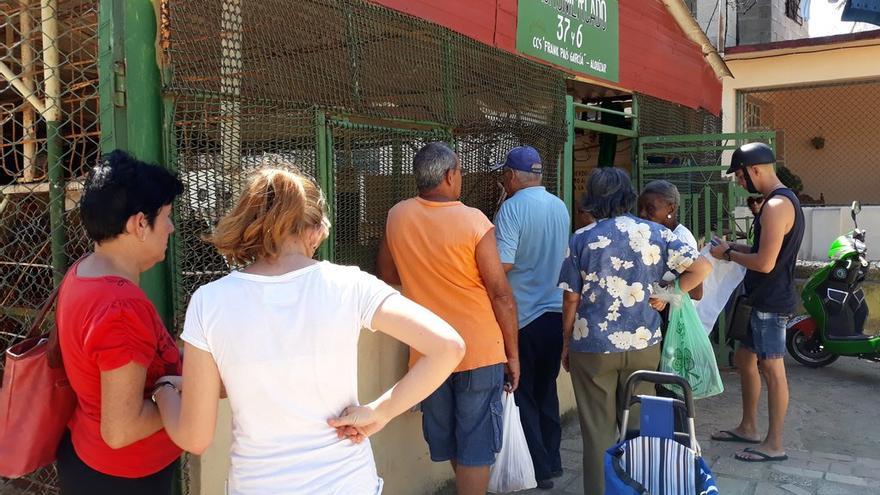
![]() 14ymedio, Marcelo Hernández, Havana, 8 April 2019 — Cuban authorities have given officials instructions to avoid the concept of “Special Period” when addressing citizens, according to 14ymedio sources in state agencies.
14ymedio, Marcelo Hernández, Havana, 8 April 2019 — Cuban authorities have given officials instructions to avoid the concept of “Special Period” when addressing citizens, according to 14ymedio sources in state agencies.
“They met with the administrative cadres to tell them that very difficult times are coming,” a worker from the Provincial Food Industry Company in Pinar del Río told this newspaper. “It was a meeting with directors of Minal (Ministry of the Food Industry) who came from Havana, where they pointed out that we could not use the phrase ‘Special Period’ in communications with the population.”
In the 90s, the government insisted on labeling the serious economic situation of the island as “A Special Period in Peacetime” to avoid the words crisis or economic collapse. The euphemism generated numerous jokes and puns, but finally prevailed, even in the headlines of the foreign press. As a result, the link between the phrase “Special Period” and that time of crisis is now so clear that the concept must be avoided.
“They told us these are times to be very careful of what is said to avoid creating alarm or giving weapons to the enemy for their propaganda against Cuba,” adds the Minal employee in Pinar del Río. “But they also clarified that we are going to have serious problems with the import of raw material in the coming months, which will affect several areas of production, including those of the Los Portales Refreshment Factory, in the municipality of Guane.”
In the information field, the same thing is happening. A recent graduate of the Faculty of Communication of the University of Havana (FCOM) who works in a radio station, explains that there is “guidance from above” to avoid the use of the phrase “Special Period.”
“We have been told that we should use phrases like ‘economic tension’ or ‘difficulties with the arrival of raw materials’ but always with an optimistic approach and making it clear that it will be overcome in the coming months,” he explains.
The young man insists that reporters and screenwriters have been urged in several meetings to underline “the obstacles and challenges” facing the island’s economy but “to avoid the use of pessimistic phrases that may cause nervousness.”
In recent weeks, the radio station where he works has received numerous calls from listeners annoyed about the shortages of basic products such as cooking oil, chicken and eggs, but the answer they must give is that “work is being done to solve these problems,” the journalist revealed. “We must convey optimism, they have told us,” he stresses.
The caution of information professionals working in official media is justified. In the past decade a sports commentator on official television said that the Special Period was not over and that provoked an angry reaction from Fidel Castro, who wrote one of his customary ‘Reflections’ denying that perspective.
The economist Carmelo Mesa Lago recalls in a recent article that, “between 1960 and 1990, Cuba received 65 billion dollars from the USSR, two-thirds of which was a gift; this aid was higher than that received for all of Latin America during the Alliance for Progress,” a program from the 1960s involving roughly 22 billion dollars in aid to Latin America. With the end of Soviet support after the collapse of the Soviet Union, “a marked decline occurred in all economic and social indicators.”
Almost three decades after the start of the crisis of the ’90s, the government has not officially announced the end of a stage that in the collective imagination is associated with power outages, food shortages and transport problems. The use of “special” alluded to the measures taken by Fidel Castro at that time targeted to cushioning the effects of the depression setting aside some of the formulas of the centralized economy and allowing: circulation of the dollar, foreign investment, family remittances from relatives abroad, and the reappearance of an emerging private sector.
After that period when the Cuban economy hit bottom, aid from Venezuela from beginning of this century began to revive the economy of the Island. Despite this, and after two congresses of the Communist Party of Cuba, the appointment of a new president of the Councils of State and of Ministers and the ratification of a new constitution, the Special Period has not been decreed to be in the past.
Signs that the Cuban economy could be heading into a similar crisis have been accentuated in recent months, as reflected in reports published in the independent and international press, following the decrease in oil shipments from Venezuela, the freezing of credit for new exports from Brazil and the end of the Mais Médicos program in which Cuban doctors worked in that South American country in exchange for significant payments, most of which went into state coffers.
Some economists suggest that the situation is far from the one that arose in the ’90s, due to the strengthening of tourism, foreign investment and the existence of more than half a million people who work for themselves as “cuentapropistas,” but in the streets of Cuba the phrase “Special Period” is beginning to be heard more and more frequently, although the official media and state officials are forbidden to say it.
________________
The 14ymedio team is committed to serious journalism that reflects the reality of deep Cuba. Thank you for joining us on this long road. We invite you to continue supporting us, but this time by becoming a member of 14ymedio. Together we can continue to transform journalism in Cuba.
